|
Is Man-Made Climate Change Real? |
|
Temperatures have been rising for the last 40 years: Global Temperatures from NOAA (US Gov't Agency in charge of weather prediction) Measured at Surface Source: NOAA Climate at a Glance Website Global Temperatures from Satellites: Source: The National Space Science & Technology Center Wikipedia: UAH Satellite Temperature Dataset at The University of Alabama in Huntsville There was warming due to increased GHG emissions until the early forties, after which air pollution, particularly sulfate particles from burning coal, built up in the atmosphere, reflecting sunlight and resulting in a couple of decades of net cooling until envionmental regulation reduced this pollution in the early seventies, after which warming resumed. The satellite data shows warming at lower altitudes and cooling at higher altitudes (as increasing concentrations of GHG's insulate higher altitudes from heat coming from sunlight being absorbed at the surface). If warming were due to increased solar radiation, we would expect warming at all altitudes. We wouldn't expect it to show up in the 5 year average data, but in the yearly data, the temperature really shoots up in the last year. Climate scientist James Hansen says that this is because prior to that, long-distance sea ships were allowed to build dirty, high-sulfur oil because there were usually no human populations near the smog, and the sulfur particles lingered in the atmosphere, reflecting sunlight and cooling the planet. More recently, the environmentalists have insisted upon these ships using cleaner fuel, so the sulfur is no longer in the atmosphere, so the planet is warming faster. |
||
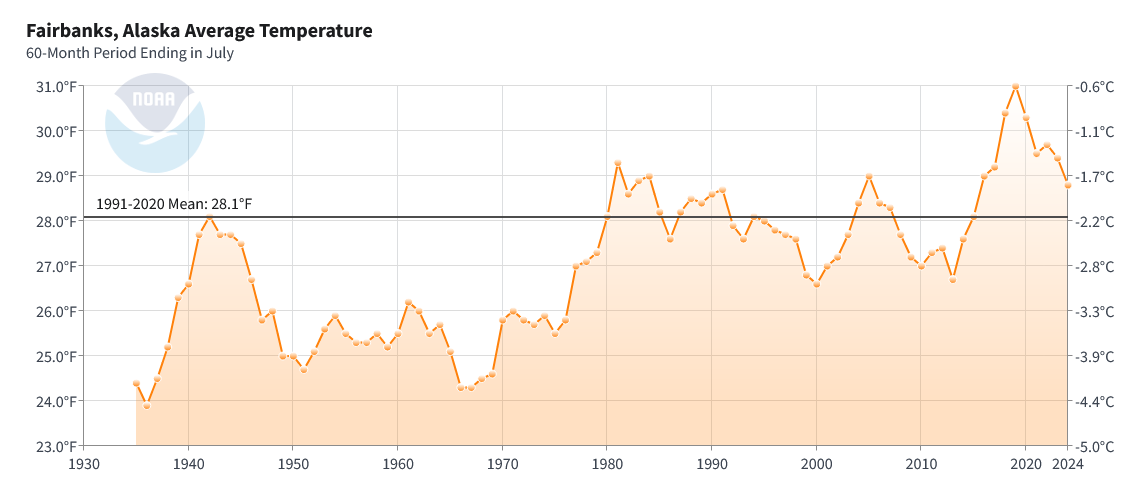 Fairbanks, Alaska Temperatures Since 1935
Fairbanks, Alaska Temperatures Since 1935Click to Enlarge 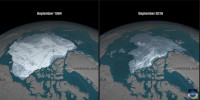 Summer Arctic Sea Ice 1979-2000
Summer Arctic Sea Ice 1979-2000Click to Watch NASA Video |
Polar Temperatures:
The temperatures at the poles have been increasing much faster than those at moderate lattitudes. While average temperature increase for the whole planet has been about one degree centigrade over the last century, the poles have increased by more like 2.5 degrees C. This is very problematic. As Arctic ice retreats, it exposes bare water, which reflects much less sunlight (ie, absorbs more heat) than the ice did, causing a positive feedback loop. In addition, there are vast quantitites of methane trapped in Arctic permafrost, and as that permafrost melts, that methane, which is a much, much more powerful GHG (heat-trapping GreenHouse Gas) than CO2, is released, causing another potential runaway feeback loop. Another problematic factor is that one of the chief determinants of wind patterns is the rate of temperature change as you travel from the equator toward the poles. As the poles warm, this rate of temperature change decreases and jet streams and wind patterns change, leading to changes of the weather and precipitation patterns upon which agriculture depends. |
|
 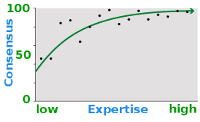
|
There is a very strong consensus among the experts. There have been many surveys of climate scientists or of technical papers on climate science, some of them very extensive. Here are some of the surveys with the level of consensus that they found:
Usually, what happens is that if you start out with a broad survey of all technical people, you get a majority, and as you narrow the field down to people whose specialty is more and more relevant to climate science, the percentage agreeing goes up, until, when you get to actual climate scientists, the consensus is very high, and then if you get to climate scientists who have published recently, it's 97%. Bear in mind that the consensus is on the statement "The Earth is warming and human emissions of greenhouse gases are the cause.". It goes no further than that! That 97% do not agree about exactly how bad it will or won't get in the future, and they certainly don't all necessarily agree with every word said in the 1,500 page UN IPCC Reports. It says nothing about the future, or what, if anything, should be done about the problem. Some of these surveys are quite large. For example, a survey by John Cook looked at abstracts for 11,944 papers on the subject of climate change, of those, 66.4% expressed no opinion since climate scientists have other things to discuss (note that "no opinion" means that they did NOT express the opinion of uncertainty), while 32.6% supported the statement, 0.7% rejected the statement, and 0.3% expressed the opinion that they weren't sure. 32.6 / (32.6 + 0.7 + 0.3) is 97%. Unfortunately, the fossil fuel industry has been funding phony studies that dispute all of these polls, so we're left with a sitation where both sides claim the other is lying. |
|

|
Lack of Consensus Among Skeptics: While the people advocating that CO2 emissions be curbed are generally all telling the same story, the opposition is all over the map:
Yet even though all these sources agree about almost nothing, they consider themselves "brothers in arms", because they agree on one important point: that we should not reduce the rate of combustion of fossil fuels. Doesn't it undermine the credibility of one side of the debate when they can't even get their story straight among themselves? Another tactic frequently pursued by climate skeptics is to say "we don't know". They think that if they create doubt, they win. But if they want to tell society to just forget about climate change and continue burning fossil fuels to our heart's content, it is incumbent upon them to arrive at a consensus around a consistent narrative of what is going on and establish with a high degree of certainty that little harm will come of radically elevated levels of CO2. And they haven't come close to achieving that. |
|
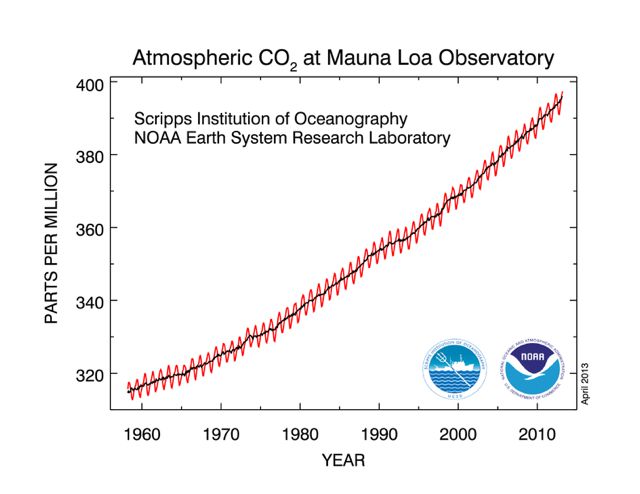 CO2 Levels Since 1960
CO2 Levels Since 1960Click to Enlarge 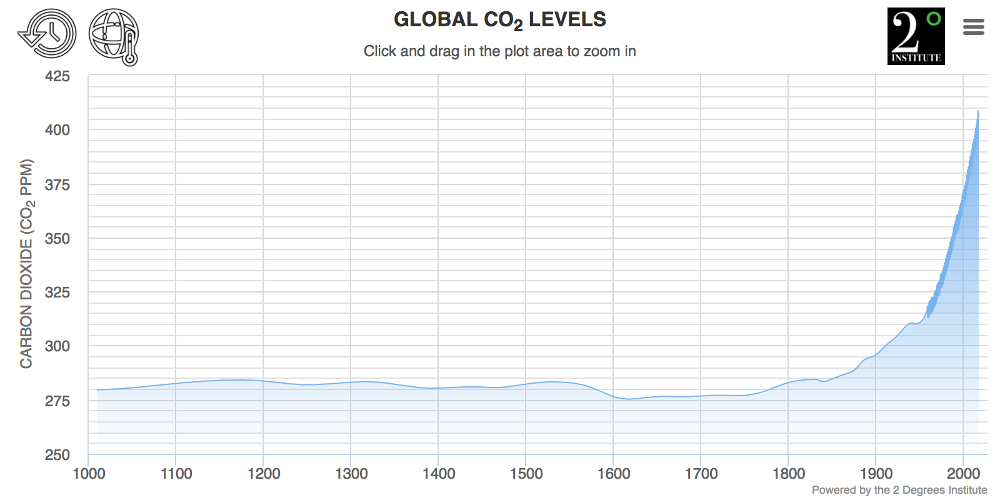 CO2 Levels: Last 1,000 Years
CO2 Levels: Last 1,000 YearsClick to Enlarge 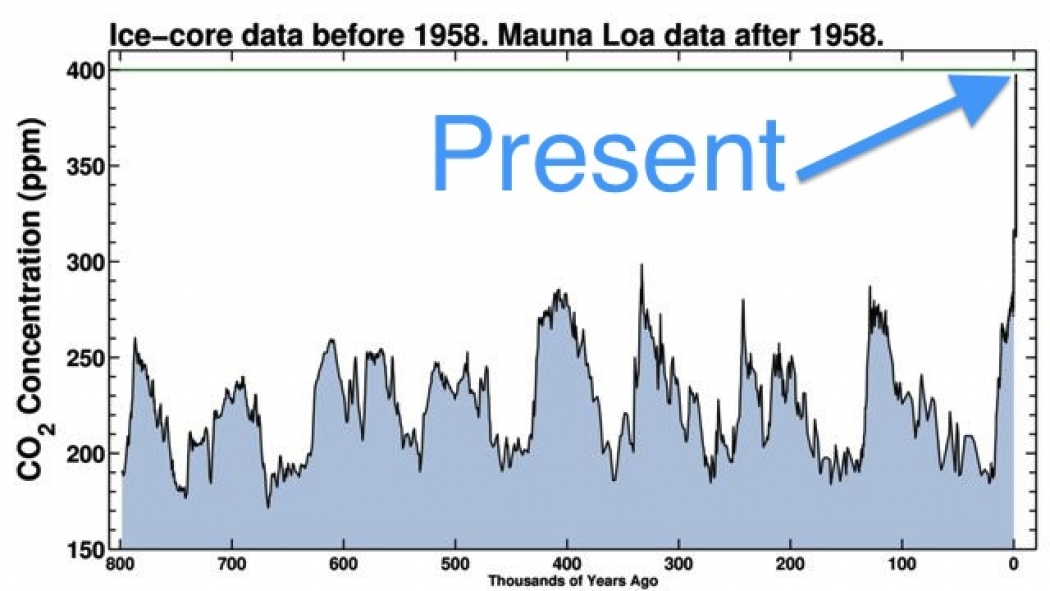 CO2 Levels: Last 800,000 Years
CO2 Levels: Last 800,000 YearsClick to Enlarge |
There's a lot of noise in the temperature data, but CO2 levels have been increasing at a very smooth rate, except for very predictable seasonal variation. We have a very reliable record of CO2 levels from Greenland and Antarctic ice cores going back 800,000 years, and current levels are completely unprecedented over that time period. Bear in mind that homo sapiens has only been around for 300,000 years. So CO2 levels have never been this high in human history. Before 800,000 ago we have geologic records that are much less precise. If you go back dozens of millions of years, for most of the planet's history, CO2 levels were many times higher than now, and temperature was too, with no ice anywhere on the planet -- none at the poles, and no glaciers in the mountains. Sea level was many dozens of feet higher than it is now. During most of the planet's history, higher CO2 levels correlate very closely with higher temperatures in the long term. Climate skeptics often point out that geologists say that there were some glaciers at a time when CO2 levels were an order of magnitude higher than now. This was about 450 million years ago -- 100 million years before the first reptiles. The sun was 5% dimmer at that time, and all that CO2 was the only thing keeping the planet from turning into a complete iceball. |
|
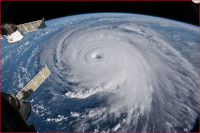 
|
Hurricanes Have Been Increasing in Frequency: For a long time, it was hard to tell whether the rate of hurricanes was increasing or not. It is not possible to determine whether any one hurricane was or wasn't "caused by climate change". The number of major hurricanes per year is a low integer, so if there was a 5% increase in the frequency of hurricanes, it would take decades of data to confirm it. In the movie An Inconvenient Truth, Al Gore spent several minutes showing footage of the devastation caused by the 2005 Hurricane Katrina, the implication being that that hurricane had been "caused by climate change", which was not a scientifically justified thing for the movie to say. But a study done in 2020 analyzed 39 years of weather satellite data over the period 1979-2017 and was able to observe that hurricanes have been getting 8% more frequent every decade. This was covered in the New York Times. |
|
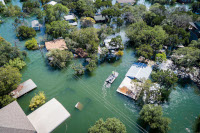 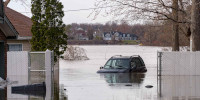 
|
Flood insurance is generally provided by the NFIP (National Flood Insurance Program), part of FEMA. FEMA cannot raise rates without permission from congress. Extreme storms have been increasing in intensity but possibly not frequency.
As flood damages have been increasing due to climate change, congress is reluctant to let FEMA charge enough for flood insurance to reflect the new reality, because in some cases the additional cost to homeowners would well exceed $1,000 per month, which would be prohibitive. The NFIP is operating at an annual loss of $36 billion. The fact that flood insurance is being provided below cost to consumers is not bad only because it costs the public billions of dollars. The price of insurance is an important market signal to tell people not to build in hazardous places. Absent such a signal, people will kepp building in harm's way. In the meantime, private insurers are raising rates to reflect increasing losses. |
|
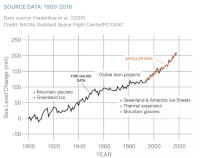 Sea Level Rise Since 1900 Click to Enlarge  Satellite data shows that the rate of sea level rise has more than tripled Click to Enlarge |
Sea Level Rise Is Accelerating: From 1900-1980, sea level rose about 115 mm (4.5"), it has risen by about the same amount again since then, in about half as much time. What's more, satellite data shows that rise has been accelerating in the few decades since the satellite monitoring sea level was launched in 1993, currenly rising at something like 38 mm (1.5") per decade. 1.55" per decade may not sound like much, but during storms, sea level can rise several feet, so those extra inches can make all the difference between being flooded and staying dry. When hurricane Sandy hit New York City, sea level rose several feet and sea water was able to flow into subway stations and flood subway tunnels, destroying the electronics inside. The tunnels of the 'L' and 'R' subways between Manhattan and Brooklyn were flooded, causing a partial shutdown of of the 'L' and a total shutdown of the 'R' for about a year. We could easily have several feet of sea level rise by 2100. Sea level rise over several decades is difficult to predict, since a lot depends on the rate at which land-based ice sheets in Greenland and Antarctica deteriorate and slide into the sea, which they tend to do suddenly, catastrophically, and unpredictably more on this here. |
|
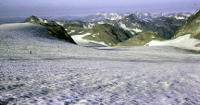 White Chuck Glacier, 1973 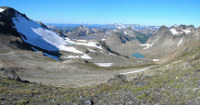 White Chuck Glacier, 2006 |
Glaciers:
90% of the world's glaciers are retreating and 10% are
advancing. Much of the world relies on seasonal melting
of glaciers for their water supply, so as glaciers
permanently recede, populations will be losing access
to fresh water.
|
|
 Estimated pH change, 1700's - 1990's
Estimated pH change, 1700's - 1990'sClick to Enlarge |
Ocean Acidification:
Much of our CO2 emissions wind up dissolving in the ocean and forming acid, so the oceans have been becoming more acidic, which will have a significant impact on marine ecosystems. The oceans are naturally slightly alkaline, but from 1751 to 1996 the pH has declined from roughly 8.25 to 8.14, which translates to a 28% increase in the concentration of H+ ions in the water. Changing the acidity of the ocean will have a profound impact on many of the fundamental chemical reactions upon which life is based. The acidity of the ocean is currently changing faster than it has at any time in the last 55 million years. Ocean fishing is one of the human race's primary food sources. |
|
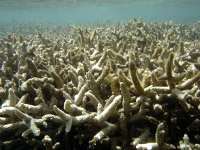
|
Coral Bleaching:
Rising ocean temperatures have been bleaching and killing coral reefs in the ocean. It is expected that if we take no action to curb global warming, we will observe a near-wipeout of our coral reefs by the end of the century. |
|
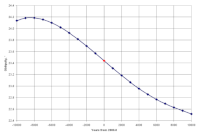 Click Image to Enlarge
Click Image to Enlarge
|
It's Not Change of the Earth's Axis:People frequently bring up change of the Earth's axis as being the cause of the warming we've observed in recent decades. This just doesn't fly, the Earth changes its axis very gradually in a regular cycle, currently changing at a rate of about 0.00012 degrees (meaning the north pole moves less than 20 ft) per year. During major earthquakes like the 2011 earthquake that caused the massive tsunami in Japan, it moves something like a foot, usually less. This is nowhere near enough change to cause the significant changes in temperature over a short time that we have observed. |
|
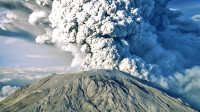  Volcano vs Human Emissions
Volcano vs Human EmissionsClick to Enlarge  CO2 Levels: Last 1,000 Years
CO2 Levels: Last 1,000 YearsClick to Enlarge |
It's Not Volcanoes:There's just no question about it, the amount of CO2 emitted by volcanic eruptions over the last few centuries is about 1/60th of human emissions Here's another source on the subject What we usually experience in big volcanic eruptions is that, for only a few hours, their greenhouse gas emissions rival those of the human race, but then the eruption ends. Usually, they emit a tremendous amount of ash into the atmosphere, and the ash particles reflect the sun, with a net colling effect. Some people just claim, off the top of their heads, that scientists aren't counting undersea volcanoes, which is hogwash. The human race has been operating a network of seismometers covering the whole planet for many decades, and any time there's a volcano, on land or under sea, our geologists know all about it. Also, even if they weren't taking undersea volcanoes into account, the area of ocean is about 2.5X the area of land, so if 1/60th of emissions are from land-based volcanoes, then it stands to reason that 2.5/60 of emissions are from undersea volcanoes, which is still not significant. And we've had a huge increase in atmospheric CO2 concentration in the last 200 years, just at the time we began burning fossil fuels. Is anyone seriously claiming that there has been a tremendous increase in volcanic activity at exactly the same time? |
|
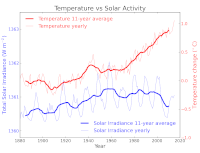 Click Image to Enlarge
Click Image to Enlarge
|
It's Not Solar Radiation:Many people attribute the warming that we have observed to an increase in solar radiation. This is a view that does not stand up to the slightest scrutiny. Click on the image at left and you see temperature in red and solar radiation in blue. Solar radiation has changed less that 0.1% in the last century, and the observed temperature has not been moving in sync with it. Furthermore, if warming were due to an increase in
solar radiation, we would observe:
Warming due to increased carbon dioxide predicts:
What we observe is C and D, not A and B. This is covered in more detail at Skeptical Science: Solar Radiation Is the Distance to the Sun Changing?:No. Tidal forces are propelling the Earth further from the sun with time, so the effect from the change of the distance from the Sun to the Earth is cooling, not warming. The Earth is moving 1/1,000,000th of a meter further from the sun every year. So the earth is 2 millimeters further from the sun than it was when Julius Caesar was killed. |
|

|
Myth: "Faked" Temperature Data: A common trope that gets circulated is that the climate scientists have been "cooking the books" to make it appear that there has been more warming than there really has. This is a story circulated by a blogger who then claimed to be named Steven Goddard and has since announced that his name is really Tony Heller. What really happened is that it turns out that averaging out temperature readings from a multitude of ground-based stations is a very non-trivial exercise. The problem is, as cities build up and the area surrounding a temperature measuring station gets paved over, the area heats up. So that has to be adjusted for. Also, there are always measuring stations being phased out and others being phased in, and some are in naturally hot spots and others are in naturally cool spots so taking the average temperature of a state, or country, or the planet is complex. As time goes on, people come up with more sophisticated and accurate ways to accumulate the average. So adjustments happen, and Steven Goddard cried foul. There was a debate about this, and it turns out that even Anthony Watts, who runs the climate skeptic website "WattsUpWithThat", disagreed with Goddard. "I took Goddard to task over this as well in a private email, saying he was very wrong and needed to do better," Watts wrote.. Goddards claim was promoted for awhile on Fox News by host Steve Doocy. Politifact rated the claim by Goddard and Doocy as a "Pants on Fire" lie. Here is some detail on a similar claim that was made in 2009 by Anthony Watts. When the "ClimateGate" emails were leaked in 2009, Berkeley professor Richard Muller was outraged, and declared that he didn't trust climate science as a discipline. He formed his own team to recreate the temperature record of the last couple of centuries from scratch. In the end, he exonerated the temperature record the climate scientists had been reporting all along. |
|

Marc Morano Famous Climate Skeptic |
Climate Hustle: This group has periodically shown the movie Climate Hustle, by nationally famous climate skeptic Marc Morano, who runs the Climate Depot website and authored The Politically Incorrect Guide to Climate Change. The movie makes many, many scientific arguments to back up his claim that global warming is not real, and we frequently stop the movie to comment on these arguments as they are made. We also have this written, detailed review of the movie. |
|

|
Skeptical
Science Website: If the reader is scientifically inclined, and wants to dive in to the details, the evidence is pretty overwhelming and with a little time, they can make up their mind on the technical merits of the case. There is an excellent website, http://skepticalscience.com, where you can look up pretty much every major argument made by climate skeptics, and find rebuttals to them. Usually, rebuttals are given at 3 levels: "Basic", "Intermediate", and "Advanced", depending on one's appetite for detail. In addition, there is a conversation following that among very intelligent climate scientists (and an occasional climate skeptic) discussing things in even more detail than that. |
|
| Conservative Climate Activists
Home Organizer: Bill Chapman Email the Organizer, |